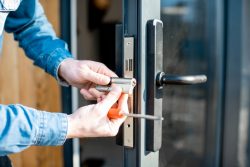Lock Maintenance Tips for Your Home
October 27, 2023 5:05 pm Leave your thoughts
Locks are an essential part of your home’s security system, providing protection and peace of mind for you and your family. To ensure your locks function properly and continue to safeguard your home, it’s crucial to perform regular lock maintenance. In this blog post, we’ll explore essential lock maintenance tips to help you keep your home secure and your locks in optimal working condition.
Regular Cleaning of Locks
Dirt, dust, and debris can accumulate in and around your locks over time, potentially causing them to jam or become less effective. Regular cleaning of your locks is a straightforward yet effective way to prevent this issue.
Here’s how to clean your locks:
a. Use a can of compressed air to blow away loose debris from the lock and keyway.
b. Wipe the lock with a clean, damp cloth to remove any remaining dirt or grime.
c. Apply a silicone-based lubricant to the lock’s moving parts, such as the bolt and latch, to keep them operating smoothly.
Lubricate Your Locks
Lubrication is a key element of lock maintenance. Proper lubrication ensures that your locks function smoothly and reduces the risk of key breakage or lock damage. Follow these steps for effective lock lubrication:
a. Choose the Right Lubricant: Opt for a graphite or Teflon-based lock lubricant. Avoid using oil-based or silicone sprays, as they can attract dirt and make the problem worse.
b. Apply Lubricant Sparingly: Insert the provided straw into the lock and spray a small amount of lubricant directly into the keyway. Be sure not to oversaturate the lock.
c. Insert and Remove the Key: Insert and remove the key several times to distribute the lubricant throughout the lock. This helps to prevent sticking and ensure smooth operation.
Test Locks Periodically
To ensure that your locks are functioning correctly, it’s a good practice to test them periodically. Follow these steps to test your locks:
a. Insert the key into the lock and turn it to ensure that the bolt or latch moves freely without resistance.
b. Check that the lock engages securely and can be fully locked and unlocked without any issues.
c. If you encounter any problems, such as difficulty turning the key or an inability to lock the door, it’s essential to address the issue promptly.
Tighten Loose Locks
Over time, the screws and bolts securing your locks to the door can become loose due to frequent use and vibrations. Loose locks are less effective at keeping your home secure. Regularly inspect and tighten the screws and bolts to maintain the integrity of your locks.
Address Rust and Corrosion
Locks exposed to the elements or in areas with high humidity are susceptible to rust and corrosion. These issues can compromise the lock’s effectiveness and durability.
To address rust and corrosion:
a. Use a wire brush or abrasive pad to gently remove surface rust from the lock.
b. Apply a rust inhibitor or a penetrating oil like WD-40 to the affected area to prevent further corrosion.
c. If the lock is severely corroded or damaged, it may need to be replaced.
Rekey Locks When Necessary
Rekeying your locks is an important aspect of maintaining home security. You should consider rekeying your locks in the following situations:
a. When Moving to a New Home: After moving to a new home, it’s essential to rekey or replace the locks to ensure that only you and your family have access.
b. After Losing Keys: If you’ve lost your keys, rekeying the lock is a smart precaution to prevent unauthorized access.
c. When Keys Are Stolen: If your keys are stolen, rekeying is essential to protect your home and belongings.
d. After a Break-In: In the unfortunate event of a break-in, rekey or replace your locks to enhance security.
e. Periodic Rekeying: As a general practice, consider rekeying your locks periodically to maintain your home’s security.
Replace Worn-Out or Damaged Locks
If you notice that your locks are worn-out, damaged, or malfunctioning, it’s important to replace them promptly. Signs that your locks may need replacement include:
a. Difficulty turning the key in the lock.
b. Frequent jamming or sticking of the lock.
c. Excessive rust or corrosion.
d. Keys that are difficult to insert or remove from the lock.
e. Broken or damaged key.
f. Keys that can be easily duplicated.
Consult a Professional Locksmith
For advanced lock maintenance, rekeying, or replacing locks, it’s advisable to consult the professional locksmiths at Toledo Lock & Key LLC. A locksmith can provide expert guidance and perform lock-related tasks with precision. Whether you need to rekey your locks, install high-security locks, or address complex lock issues, a locksmith is your go-to expert for lock maintenance and security enhancements.
Lock maintenance is a fundamental aspect of home security. By following these lock maintenance tips, you can ensure that your locks continue to provide effective protection for your home and loved ones. Regular cleaning, lubrication, testing, and addressing issues like rust or corrosion are essential practices to keep your locks in optimal working condition. Additionally, rekeying or replacing locks when necessary is crucial for maintaining home security and peace of mind. If you have any doubts or face complex lock-related issues, it’s always wise to seek the assistance of a professional locksmith who can provide expert solutions to enhance your home’s security.
Categorised in: Lock Maintenance
This post was written by admin

